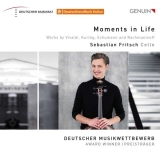Der Gewinner des Deutschen Musikwettbewerbs 2019 war der Cellist Sebastian Fritsch, der sich nun mit einer in allen Hinsichten anspruchsvollen Debut-CD vorstellt. Moments of Life ist ein allgemeingültiger und an sich wenig aufschlussreicher Titel, da es immer besondere Momente im Laufe des Lebens eines Komponisten sind, wenn er ein Werk komponiert, und auch eine CD-Einspielung eines Interpreten ist eine Momentaufnahme seines Wirkens. Was sich aber hinter dem Titel versteckt, das ist wirklich hervorragend. Sebastian Fritsch hat sich vier wunderbare Werke aus vier Epochen vorgenommen.
Das Programm beginnt mit einer hervorragend gespielten Cello-Sonate von Antonio Vivaldi, die bereits im einleitenden Largo hellhörig macht. Hier geht ein junger Musiker zu Werke, der quasi eins zu sein scheint mit seinem Instrument und mit der Musik. Sebastian Fritsch sucht den Klang und findet ihn auf eine ganz natürliche Weise. Sein Instrument ist ein hervorragendes, gut ausschwingendes und sehr warm klingendes Cello von Thorsten Theis aus dem Jahre 2016, mit sehr viel Körper, einem runden Klang und einer angenehmen Präsenz.
Fritsch geht Vivaldi sehr lyrisch und mit viel Schönheit an. Überhaupt zieht sich diese Suche nach dem Kantablen, Ansprechenden und Schönen wie ein roter Faden durch sämtliche Werke. Mit der gleichen Wärme wie bei Vivaldi interpretiert Fritsch auch fünf Stücke aus Signs, Games and Messages von György Kurtag. Seine individuelle Gestaltung macht auch hier hellhörig. Er ist ein Musiker, der tatsächlich das musikantische Element in der zeitgenössischen Musik sucht, und das trotz der gewollten Schärfen und Akzente in den Stücken. So zeigt Fritsch, dass Kurtags Werk durchaus auch für den normalen Hörer absolut verdaulich ist und interessant sein kann.
Mit Robert Schumanns Fantasiestücken op. 73 hat Sebastian Fritsch keine Schwierigkeiten, sich auch als hervorragender Interpret romantischer Musik darzustellen. Eigentlich ist dieser Schumann das Herzstück der CD und somit auch der Ausgangspunkt von Fritschs doch sehr romantischen Interpretationskonzepten. Auch in Rachmaninovs Cello-Sonate op. 19, die der Komponist direkt nach seiner psychischen Krise für seinen Psychiater geschrieben hat, kann Fritsch die Seelenzustände sehr gut darstellen. Wie alle anderen Werke spielt der Cellist sehr klangintensiv und expressiv, ohne allerdings in Larmoyanz oder sentimentale Effekte zu verfallen.
An seiner Seite hat Sebastian Fritsch ebenfalls hochkarätige Partner: Oliver Triendl ist ein intensiv mitgestaltender Partner bei Schumann und Rachmaninov und Olga Watts leuchtend-virtuoser Cembaloklang ist eine Offenbarung für die Darbietung der Vivaldi Sonate, die Fritsch hie zusammen mit seiner Lehrerin, der Cellistin Lisa Neßling spielt.
























